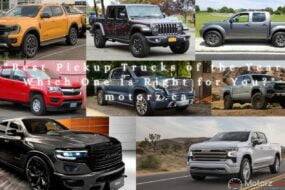Ford’s Iconic Trucks A Journey from the Model T to F-150 a name synonymous with automotive innovation, has left an indelible mark on the truck industry. The evolution of Ford trucks is a captivating journey through time, reflecting not only advancements in automotive technology but also the changing needs and preferences of consumers. Ford releases the Model TT, essentially the ancestor of modern pickup trucks. This heavy-duty vehicle wasn’t just a means of transportation; it was a workhorse, capable of hauling goods and transforming industries like agriculture and construction.
The Birth of a Legend: Model T
The inception of Ford’s Iconic Trucks dates back to the early 20th century when the Model T revolutionized the automobile industry. While primarily known for its role in the birth of modern cars, the Model T laid the foundation for Ford’s venture into the truck market. Introduced in 1917, the Model TT was Ford’s first attempt at a dedicated truck, designed to meet the demands of businesses and industries.
The Tough Times: Great Depression and World War II
The Great Depression and World War II posed significant challenges for the automotive industry, including Ford. However, these challenging times also spurred innovation. Ford’s trucks evolved to meet the demands of the era, showcasing resilience and adaptability. The flathead V8 engine introduced in the 1930s enhanced performance and set the stage for the powerful trucks to come.
Post-War Boom: F-Series Emerges
The post-war era witnessed a surge in economic activity, and Ford responded by introducing the F-Series in 1948. The F-1, the first in the series, marked the beginning of Ford’s dominance in the truck market. With its distinctive design and robust performance, the F-Series trucks quickly became a favorite among consumers and businesses alike.
Shifting Gears: Bronco and Ranger
In the midst of the F-Series success, Ford’s Iconic Trucks explored other avenues in the truck segment. The Bronco, introduced in the 1960s, aimed at the growing market for off-road vehicles. Its compact size and rugged design appealed to adventure seekers, establishing a new niche for Ford. The Ranger, a compact pickup, made its debut in the 1980s, catering to consumers looking for a versatile and more fuel-efficient option.
The Rise of the F-150
As the years rolled by, the F-Series underwent several transformations, with the F-150 emerging as the flagship model. The F-150, introduced in the late 1970s, represented a shift towards lighter and more fuel-efficient trucks without compromising on power and capability. Its success was monumental, solidifying Ford’s position as a leader in the pickup truck market.
Innovation and Technology: 21st Century
The 21st century saw Ford’s Iconic Trucks embracing cutting-edge technology. The introduction of aluminum alloy bodies in the F-150 marked a significant leap in design and efficiency. The use of advanced materials reduced weight, enhancing fuel efficiency without compromising strength. Additionally, the integration of smart technologies and connectivity features transformed Ford trucks into modern, intelligent vehicles.
Sustainable Future: Electric Trucks
In response to the growing emphasis on sustainability, Ford has ventured into the electric truck market. The F-150 Lightning, an all-electric variant of the iconic F-150, symbolizes Ford’s commitment to environmental responsibility. With zero emissions and powerful performance, the F-150 Lightning paves the way for the future of trucks.
Conclusion
Ford’s Iconic Trucks journey from the Model T to the F-150 is a testament to the brand’s resilience, innovation, and adaptability. The iconic trucks have not only witnessed the evolution of automotive technology but have also played a pivotal role in shaping the truck market. As Ford continues to push boundaries with electric trucks and advanced features, the legacy of its iconic trucks remains firmly ingrained in the history of automotive excellence.











